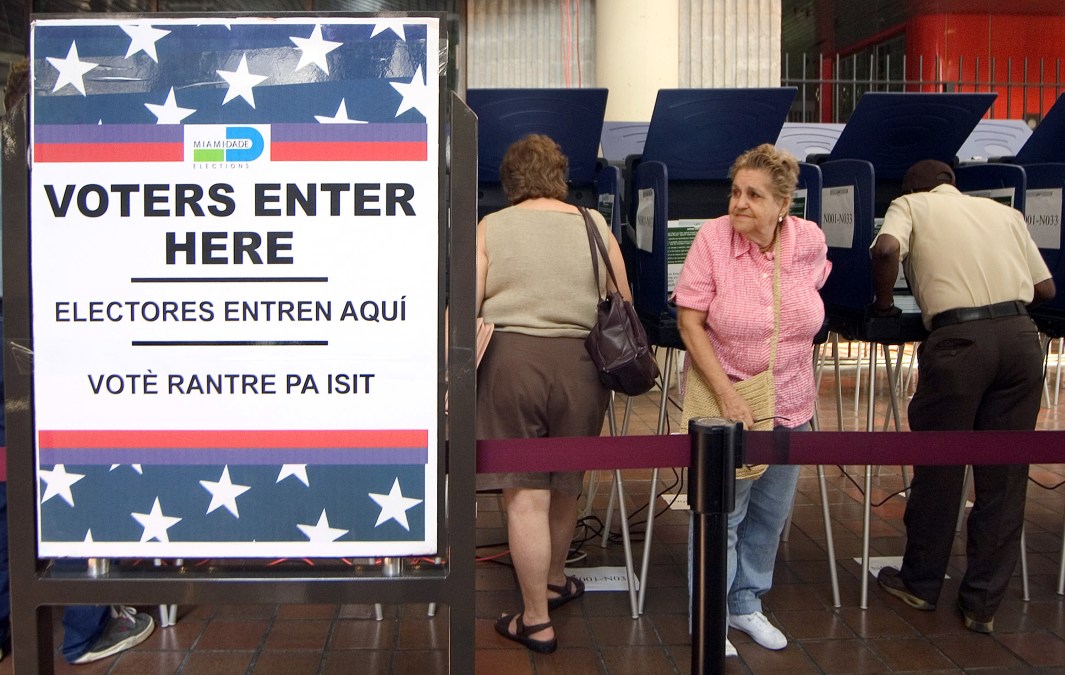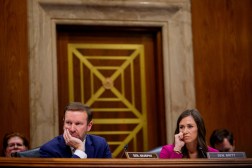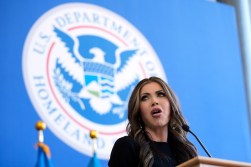Spanish-speaking voters are in the crosshairs of disinformation agents

Latino and Hispanic voters are viewed as a critical, up-for-grabs bloc this election cycle, with Republican Donald Trump showing signs of making significant inroads with the groups in polling and advisers to Democrat Kamala Harris singling out those votes as key to winning battleground states like Florida, Nevada, Arizona and Pennsylvania.
These voters were bombarded with Spanish-speaking mis- and disinformation in the final weeks of the 2022 and 2020 elections, and some Latino groups are sounding the alarm again this year.
“We’re concerned about the spread of misinformation, disinformation and malinformation, which augments the problem that we have with a lack of access to credible information as it is,” Juan Rosa, national director for civic engagement at the National Association of Latino Elected and Appointed Officials, said last week during a press call focused on electoral issues facing minority and non-English-speaking communities.
Rosa said that with the rise of Latino and Hispanic voters, the demand for “timely and accurate” information has grown. NALEO and similar organizations have formed the Election Protection Commission, a nonpartisan network of national, state and local organizations that safeguards minority and non-English voters’ rights, including by combatting disinformation.
A hotline set up by NALEO to provide voter information and resources to Spanish-speaking audiences received more than 4,500 calls over the summer, with about 80% coming from voters who were seeking clarity about basic elements of election administration. Rosa said they’ve also helped recruit law firms to help monitor social media for rumors or false information posted in Spanish.
Sustained efforts to deceive voters this year have come from both domestic actors hoping to sway voters to their side and from foreign governments attempting to drive a wedge between different demographic groups, potentially putting their thumb on the scale of electoral results.
Roberta Braga, founder and executive director of the Digital Democracy Institute of the Americas, told CyberScoop that one of the most popular false narratives among Latinos claims that Democratic politicians aim to implement socialist or communist policies akin to those in Venezuela and Cuba.
Other narratives, like the widespread claim from the Trump campaign that noncitizens are voting en masse for Democrats, may be more about targeting white voting groups but end up “scapegoating” Latino and Hispanic populations in the process.
Surveys conducted this year by Braga’s organization found that attacks on “elites” and institutions resonate with Latino and Hispanic voters the most, a reaction she suggested could stem from the broader distrust that both longtime citizens and new arrivals have in their experiences with government.
“There are some real things that people are dealing with, real pain points, and disinformation spreaders are using that anxiety and fear in those hardships to foment more distrust in elites and institutions,” Braga said. “And it’s working, in my opinion.”
While federal agencies like the Department of Justice have also encouraged Latino and Hispanic voters to contact them with concerns, Rosa said many are more comfortable having those conversations with organizations like NALEO.
“We conduct outreach in a way that is culturally accessible, that is closer to the ground, and that creates trust among community members,” Rosa said. “So oftentimes, [Latino and Hispanic voters] will know to call us because they see us on Telemundo or Univision … or their ethnic community radio or paper, as opposed to the Justice Department, which can feel far removed in Washington and also dealing in criminal law.”
According to the Pew Research Center, approximately 1 out of 5 Latino Americans (21%) prefer to get their news from social media rather than other platforms, roughly twice the share of white Americans (10%) and also more than Black Americans (13%).
That could make the group more vulnerable to viral false or conspiratorial content. Officials from organizations serving Latino populations have specifically cited YouTube, WhatsApp and cultural “dis-influencers” as key distribution channels for propaganda, unfounded rumors about voter fraud, and other false claims.
Their electoral importance, along with a dearth of Spanish-centric election resources and local news options, can make these groups an inviting target for influence operations at home and abroad.
Alden Wahlstrom, a principal analyst at Mandiant and Google Cloud, said they are currently tracking a number of foreign and domestic information operations that have targeted Latin American and Spanish-speaking audiences. They include likely foreign-directed campaigns spreading pro-Russia, pro-China and pro-Iran propaganda online.
“While this activity has engaged with local issues and/or issues specific to the target demographic, a unifying characteristic across these operations is their promotion of specific narratives and issues consistent with those promoted elsewhere by the political-nexus actors with which they are aligned,” Wahlstrom said.
U.S. intelligence officials have confirmed that foreign governments, like Russia and Iran, are using artificial intelligence and other tools to craft persuasive phishing lures and social media content in Spanish and other languages this campaign cycle.
Earlier this month, officials at the Office of the Director of National Intelligence said for the first time that the Cuban government has taken a keen interest in down ballot congressional and state races this year, while also “trying to curry favor from congressional and subnational politicians that it believes would support its preferred policies.”
Cuba “probably views this year’s election as consequential and Havana almost certainly has considered influence operations targeting some candidates,” an ODNI official said.
Hispanic and Latino voters are also subject to disinformation from domestic political actors, with government agencies and community activists noting these groups are being targeted by disinfluencers and misinformation in other contexts.
Deanne Criswell, administrator for the Federal Emergency Management Agency, said in response to a CyberScoop question during a press briefing that while FEMA routinely deploys Spanish-speaking personnel to conduct outreach and offer resources to counter false rumors or disinformation, they have had to augment those programs during recovery efforts for hurricanes Helene and Milton in order to deal with the sheer amount of false information fed to Spanish-speaking populations.
David Becker, executive director for the Center for Election Innovation and Research, believes the disinformation campaigns that started during the hurricanes are “likely to continue” throughout the election and play into claims of a stolen election in closely fought states where Trump loses.
He said getting accurate information to Spanish and non-English-speaking audiences has been a “big concern” in the election community this cycle, offering two possible reasons for why these groups may be more exposed to false or inaccurate claims around elections.
The first is that these groups often have fewer credible news and information outlets focused on American politics to choose from. Second, Spanish and other non-English-speaking disinformation can often go unchecked because many observers focused on the topic do not speak those languages or regularly consume local or cultural news sources that cater to those groups.
Several experts pointed to the role that local influencers in the Latino and Hispanic communities play in spreading false information and undermining the electoral process. These figures are usually both conservative and ensconced in Spanish-speaking communities.
Alexander Otaola, for example, is a Cuban-American conservative firebrand who hosts “Hola! Ota-Ola,” a popular show on YouTube. Otaola has endorsed Trump and embraced the candidate’s false claims around voter fraud. He even ran for mayor in Miami-Dade County, Fla., home to the highest concentration of Cuban-American voters in the country.
A few weeks before election day, Otaola’s campaign put out a press release alleging to have found “shocking and unacceptable violations within Miami-Dade County’s election process” and claiming that witnesses observed election officials instructing voters to cast their ballots for Democratic candidates.
On X, the Miami Dade County Elections Department responded to the post by noting that they had not received any complaints from voters at early voting sites and that each site had multiple poll watchers to observe election procedures. Otaola never responded, and his post was retweeted by dozens of accounts with Spanish-language biographies, many of which described themselves as staunchly anti-communist.
The day after the election, where he received less than 12% of the vote, came in a distant third and lost by more than 30 points to Democratic incumbent Daniella Levine Cava, Otaola’s campaign demanded a recount. Otaola’s request was denied, with Miami-Dade officials noting that recounts are triggered automatically depending on the closeness of the race, not because of requests by candidates.
Rather than stick around to try and prove his claims of fraud, Otaola posted four days later that he was headed out of the country on vacation.






